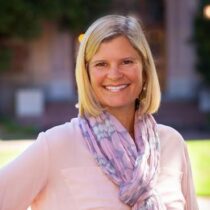
Leslie Rupert Herrenkohl
Professor, educational studies, School of Education
Leslie Rupert Herrenkohl is a professor of educational studies at the University of Michigan. She is also a faculty member in the Combined Program in Education and Psychology. She is a developmental psychologist and learning scientist who is fascinated by how people learn. She brings a holistic, critical sociocultural approach to examining how people learn concepts, develop practices, and transform their participation in activities that matter to them. Herrenkohl’s current research focuses on human learning and pedagogical practice inside and outside of school, particularly in science-related learning contexts.
As a designer of learning environments, Herrenkohl supports powerful learning that is conceptually rich, personally meaningful, and culturally relevant and sustaining. She creates learning environments inside and outside of school settings and then studies how people learn within them. In order to do this work, she partners with practitioners. These collaborations give her a deep appreciation for the need to integrate theory and practice and to conduct iterative research to better understand the impact of particular approaches and strategies.
One ongoing collaboration, STUDIO: Build Our World, was launched with support from the National Science Foundation in 2013. STUDIO is an afterschool STEM program that provides low-income, immigrant, and refugee youth opportunities to develop interests, identities, and motivations to pursue further STEM learning. STUDIO built upon an existing youth leadership program within a multiservice community-based organization and is situated at the heart of a public housing community that provides many health, education, and job training services to youth and their families. University of Washington STEM undergraduates serve as mentors within STUDIO and attend a weekly seminar as part of their undergraduate studies. Herrenkohl has presented about the STUDIO model in many venues including conferences, NSF webinars, and the U.S. Department of State’s International Visitor Leadership Program. In 2015, she was invited to the White House for a Summit on Next Generation High Schools.
A current research project undertaken in the context of STUDIO is a one-year study to document how youth, educators, and mentors learn the science of COVID-19 in real time. This includes how people activate their scientific knowledge toward informed decision making, how these processes change over time, and how this is shaped by equity concerns and contextual factors alongside other forms of knowledge. This project is funded by the National Science Foundation.
Another current project is a five-year study focused on teachers’ facilitation of equitable discussions across the curriculum in elementary school contexts. This project investigates the impact of targeted teacher professional learning opportunities focused on leading equitable discussions on teachers’ pedagogical practices as well as their perceptions of their learning and practice. This project is funded by the National Science Foundation.
Herrenkohl serves on the editorial board for the American Educational Research Journal, Cognition & Instruction, and Science Education. Her publications appear in Educational Researcher, Cognition & Instruction, the Journal of the Learning Sciences, Science Education, and Teachers College Record, among other outlets.
PhD and MA, Clark University; BA, Lafayette College.

